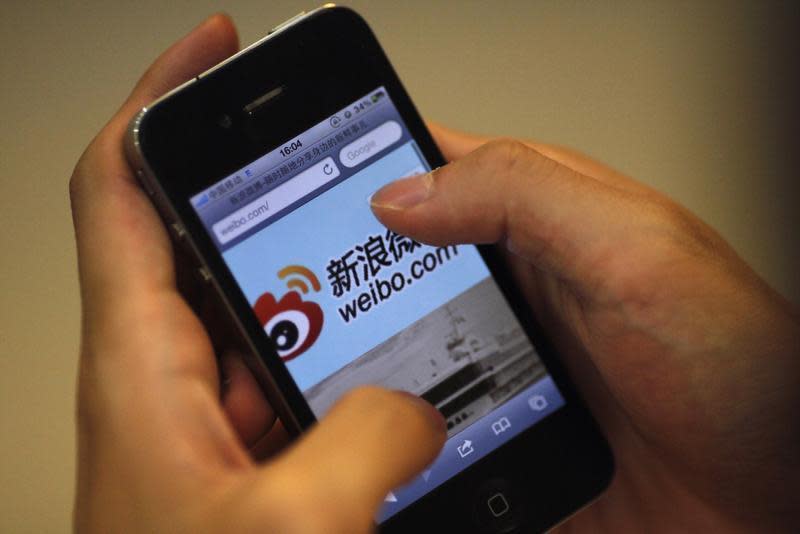Weibo cuts IPO size amid selloff in technology stocks
(Reuters) - China's Weibo Corp, a Twitter-like messaging service company, raised a less-than-expected $286 million after it cut the size of its U.S. initial public offering amid a selloff in technology shares and concerns about slowing user growth.
The offering comes ahead of the much-anticipated IPO of Chinese e-commerce giant Alibaba Group Holding Ltd, which holds stake in Weibo.
Alibaba is expected to raise about $15 billion this year in what could be the biggest internet IPO since Facebook Inc's listing in 2012.
Weibo, controlled by Web portal company Sina Corp, sold 16.8 million American depositary shares (ADSs) at $17 each, the company said on Thursday.
At the offer price, Weibo is valued at $3.46 billion.
Weibo's shares are due to start trading on the Nasdaq on Thursday under the symbol "WB."
The company, whose name means "micro blog" in Chinese, had earlier planned to sell 20 million ADSs at between $17 and $19 each.
The company priced the shares at the lower end of the range because of the recent stock market turmoil, particularly in technology shares, a banker who worked on the IPO told Reuters.
Weibo also intentionally sold fewer shares than initially planned to lower dilution. "We wanted to have a deal that works from a market perspective," said the banker, who declined to be named because he was not authorized to speak to the media.
There has been a pullback in the equity markets as fears of stretched stock valuations turn investors to safer sectors such as utilities.
High-flying technology and biotechnology shares have borne the brunt of the pullback, with the tech-heavy Nasdaq Composite index recording its biggest drop in two-and-a-half years last week.
CENSORSHIP CONCERNS
Since its launch in 2009, Weibo has become China's water cooler, where nearly 600 million Internet users discuss everything from Korean soap operas to China's politics.
Like many other Internet firms, the company has to operate in a heavily censored and tightly controlled media environment in China.
A rule that took effect in September imposes a prison sentence of up to three years on people who knowingly share false information online.
The crackdown on rumors had a chilling effect on Weibo postings. Research commissioned by The Telegraph newspaper found that posts fell as much as 70 percent after the crackdown.
"Much of the decline happened in the second half of 2013 when the Chinese government started to crack down on rumors being distributed on the sites," said Marvin Lo, an analyst at Mizuho Securities in Hong Kong.
Weibo is also grappling with the flight of users to messaging apps such as Tencent Holdings Ltd's WeChat. Unlike Weibo, where posts are visible to anyone, WeChat conversations are private.
Weibo had 143.8 million monthly active users in March.
The company's revenue almost tripled to $188.3 million in 2013, while net loss narrowed to $38.1 million from $102.5 million.
Goldman Sachs (Asia) LLC and Credit Suisse were the lead underwriters to the offering.
(Reporting by Tanya Agrawal and Aman Shah in Bangalore and Yimou Lee, Elzio Barreto and Denny Thomas in Hong Kong; Additional reporting by Arnab Sen; Editing by Gopakumar Warrier and Kirti Pandey)

 Yahoo Finance
Yahoo Finance 

